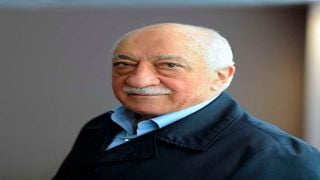
Exiled Turkish Muslim preacher Fethullah Gulen at his residence in Saylorsburg, Pennsylvania. His nephew, identified as Selahaddin Gulen, was abducted in Nairobi on May 3, 2021.
| AFPNews
Premium
Why order not to deport abducted Turk might be too late
What you need to know:
- The Turkish national's lawyer, Mr Jothan Arua, said they were still looking for his client.
- Abduction came two days before the courts ruled on a matter challenging the Turk's extradition to Turkey from Kenya.
A Turkish man who was abducted on Monday morning by people believed to be Turkish intelligence officers got a reprieve after the courts ruled he should not be arrested, extradited or deported from Kenya.
The Thursday morning ruling by a court in Kiambu might, however, have come a little too late for the man identified as Selahaddin Gulen, with reports that he might already have been taken out of the country.
His lawyer, Mr Jothan Arua, said they were still looking for his client.
“We don’t know where he is. We hope he is still in the country,” Mr Arua told the Nation.
The abduction of Mr Gulen mirrors the 1999 capture of Abdullah Ocalan, who was on top of the Turkish government’s list of wanted men.
Mr Gulen is the nephew of Fethullah Gulen, an influential cleric and former ally of President Recep Tayyip Erdogan, whose followers were in 2016 accused of participating in a plot to overthrow the Turkish government
The 80-year-old cleric has been living in Pennsylvania in the US since 1999, but still has a wide following in Turkey. He remains the single most fiery opponent of President Erdogan’s administration.
“Mr Gulen was with someone else at the time he was abducted. However, the other individual was left free yesterday,” Mr Arua said.
Child molestation case
The Turkish national was abducted on his way to the Directorate of Criminal Investigations (DCI) headquarters on Kiambu Road, where he was to meet Interpol officers to clear his name over allegations that he was wanted in Turkey to face trial for an alleged child molestation case.
In court documents obtained by the Nation, he says he was tried and acquitted of the charges in 2008 and that under the Turkish law the charges cannot be reopened.
His abduction came two days before the courts ruled on a matter challenging his extradition to Turkey from Kenya.
Mr Gulen sued the Kenyan government last year, seeking orders to stop his arrest, deportation or extradition citing possible persecution in his home country.
He said “the real motive behind the issuance of the Red notice is that, in 2016 (when I lived in the US) there was a failed coup attempt in Turkey. It is suspected that one Fethulla Gulen (my uncle) may have supported the coup,” he said in court papers, adding, “All his relatives who were physically present in Turkey were arrested on fictitious criminal charges and are serving long prisons sentence in Turkey.”
He had arrived in Kenya on October 17 last year on a tourist visa from the US – where he is a resident and his uncle is on self-imposed exile – only to be arrested at JKIA.
Following the coup attempt, President Erdogan ordered a crackdown on followers of Fethullah Gulen, which has resulted in several arrests worldwide.
Gülen movement
The cleric’s followers – so-called “Gülenists” – appear to think of themselves as reformers, revolutionaries even.
Gulen’s was initially a national movement that kept expanding even after the cleric left Turkey for the United States in 1999, officially for health reasons.
In Kenya, the Gulen movement runs the Light Academy schools, which are six in total, with four located in Nairobi and two in Mombasa.
Back at home, however, the movement is derogatorily referred to as the Fethullah Terrorist Organisation (FETÖ). Turkey claims FETÖ is out to topple the government by hook or crook.
By 2018, Turkey had snatched more than 100 alleged members of the Gülen movement from other countries in recent years.
Just like the abduction of Mr Gulen, there have been similar abductions of Gulenists in Azerbaijan, Ukraine, Gabon and Kosovo.
Last month, Turkish prosecutors ordered the arrest of 532 suspects, including 459 serving military personnel, in an operation targeting people linked to Fethullah Gulen, according to Al Jazeera.





